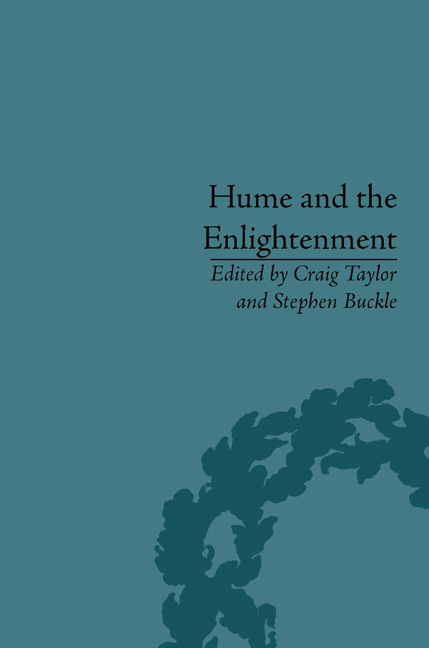Book contents
- Frontmatter
- CONTENTS
- Acknowledgements
- List of Contributors
- Abbreviations
- Introduction: Hume and his Intellectual Legacy
- 1 Hume and the Enlightenment
- 2 Will the Real Enlightenment Historian Please Stand Up? Catharine Macaulay versus David Hume
- 3 Philosophy, Historiography and the Enlightenment: A Response to Green
- 4 Hume's Enlightenment Aesthetics and Philosophy of Mathematics
- 5 Part 9 of Hume's Dialogues and ‘The Accurate Philosophical Turn of Cleanthes
- 6 ‘Strange Lengths’: Hume and Satire in the Dialogues Concerning Natural Religion
- 7 A Modern Malignant Demon? Hume's Scepticism with regard to Reason (Partly) Vindicated
- 8 Hume on Sympathy and Cruelty
- 9 Hume's Natural History of Justice
- 10 Hume and Rawls on the Stability of a Society's System of Justice
- 11 Can Hume's Impressions of Reflection Represent?
- 12 Mechanism and Thought Formation: Hume's Emancipatory Scepticism
- Notes
- Works Cited
- Index
8 - Hume on Sympathy and Cruelty
- Frontmatter
- CONTENTS
- Acknowledgements
- List of Contributors
- Abbreviations
- Introduction: Hume and his Intellectual Legacy
- 1 Hume and the Enlightenment
- 2 Will the Real Enlightenment Historian Please Stand Up? Catharine Macaulay versus David Hume
- 3 Philosophy, Historiography and the Enlightenment: A Response to Green
- 4 Hume's Enlightenment Aesthetics and Philosophy of Mathematics
- 5 Part 9 of Hume's Dialogues and ‘The Accurate Philosophical Turn of Cleanthes
- 6 ‘Strange Lengths’: Hume and Satire in the Dialogues Concerning Natural Religion
- 7 A Modern Malignant Demon? Hume's Scepticism with regard to Reason (Partly) Vindicated
- 8 Hume on Sympathy and Cruelty
- 9 Hume's Natural History of Justice
- 10 Hume and Rawls on the Stability of a Society's System of Justice
- 11 Can Hume's Impressions of Reflection Represent?
- 12 Mechanism and Thought Formation: Hume's Emancipatory Scepticism
- Notes
- Works Cited
- Index
Summary
I shall focus on the question of the humaneness or cruelty of the whole morality, and this is a Humean focus. The Kantian may not care so much about our findings here, since she, if she is true to the master, regards masturbation and suicide as the very worst thing a person can do, whereas it was cruelty that Hume regarded as the worst vice.
Those sympathetic to Kant's moral theory will no doubt hold Baier here as massively unfair to him. More particularly – and once they have recovered their composure – one question they may ask is whether Hume really provides us with an account of what is wrong, indeed morally terrible, about cruelty. There is no doubt given his frequent references to cruelty, especially in his History of England, that Hume was most appalled by it. However what is more doubtful is whether we can find in his moral theory an adequate account of the offence to another that occurs in the case of cruelty, or at least in the case of extreme cruelty. Here the Kantian may press that what Hume lacks is something like Kant's ‘formula of humanity’. While that is a possibility I will consider, what I will argue in the end is that what Hume really lacks is simply an adequate account of the significance of those immediate and unreflective or natural ways in which human beings are moved to respond to the suffering of another.
- Type
- Chapter
- Information
- Hume and the Enlightenment , pp. 117 - 130Publisher: Pickering & ChattoFirst published in: 2014



